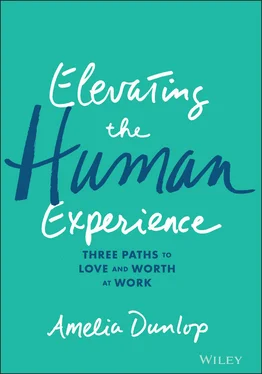More than 120 years ago, French sociologist Emile Durkheim named this distortion of work “anomie,” the dichotomy of self-worth and work. It is the alienation of self in bureaucratized work that keeps us unaware of our most fundamental human desires. Karl Marx described the theory of alienation as dividing people from aspects of their human nature. The typical workplace institutionalizes a divide between professional and personal. The nerdy part of me that majored in sociology in college got excited when I read this. I picked up a copy of Eric Fromm's, The Art of Loving, written in the 1950s. He wrote, “Automatons cannot love.” Yes! That was it. I had been working my whole life, but I had become alienated from my ability to love myself or others, particularly in the workplace. No wonder I still struggled to feel worthy of love. I had spent my life working, to become a better worker, with feedback forms and performance-related bonuses to prove it, but in doing so, I had learned that my worth was only as valuable as the next paycheck or the next round of feedback from superiors. Perhaps that is why only 38% of us currently feel safe to be vulnerable at work, and why 75% of us want our companies to place more value on human worth. We have for too long been familiar with the feeling of Durkheim's anomie, living as Fromm's automatons, experiencing Marx's alienation from our work and in need of something more human, something more worthy, something more loving.
Work becomes distorted when we prize our intellectual quotient( IQ) over our emotional quotient (EQ), our head over our heart.In To Love and Be Loved, Sam Keen, a philosopher and psychologist, bids us, “Consider the lopsided amount of attention we have paid to the definition, measurement, and cultivation of intelligence, in contrast to our failure to investigate the many modes of love.” There are customer or workforce personas, not individual personalities of humans with personal stories of love and loss. We learn, erroneously, to value people's worth based on their production and to value different people differently, often with biases that are unconscious. There are so many kinds of bias: physical appearance bias, attribution bias, gender bias, affinity bias, racial bias, confirmation bias—the list goes on.
We value love and connectedness in our personal lives, but often leave our humanity at home when we go to work. In Love and Profit, James Autry asks where we got the idea that there is an “acceptable separation of intellect and the spirit,” and where all “this hiding of emotion” behind a “cool mask of macho detachment” comes from. We need to stop wearing the mask both for our own sakes and for the sakes of others around us. Indeed, 77% of the 6,000 people surveyed want to bring their whole selves to work: both head and heart, both IQ and EQ.
Work becomes distorted when we do the very natural thing of forming our workplaces into hierarchies.Why do hierarchies form in the first place? Why did computational networks, corporate networks, and neural networks all follow the same patterns? It turns out that hierarchies arise whenever there is a cost for networks to connect with each other. When there are no costs in transacting, hierarchies do not form. The natural world—including biology, neurology, ecology, and genetics—all evolve more efficiently when “like items” are grouped together in modular format and subordinated into a hierarchy. Imagine a group of tribespeople, or perhaps a group of kindergarteners all trying to talk through and resolve a problem with a warring kindergarten class over the use of the swing set at recess. It would be so much more efficient for opposing tribes to appoint an elder to represent their views than for all members of the community to try to resolve a conflict one-on-one. Hierarchies thrive on efficiency. They can be seen as necessary to reduce transaction costs and create order. However, hierarchies become distorted when they exert power over, as opposed to power for , a specific nondominant group. And they become distorted when they reduce the diversity in organizations to a single normative type of any homogeneous group, such as White and male.
Work becomes distorted when work becomes the whole of life, as opposed to just one piece.According to data from the US Bureau of Labor Statistics, the average productivity per American worker has increased 400% since 1950. And the International Labor Organization states, “Americans work 137 more hours per year than Japanese workers, 260 more than British workers, and 499 more than French workers.” Work consumes us and leaves many of us feeling depleted.
Overly long working days combined with our hyperconnectivity in the digital world is making us feel less and less emotionally connected. We can work from anywhere now as more work shifts to virtual environments, but our rootlessness has only created a deeper desire for roots.
Work becomes distorted when our labor is exchanged for money, but different work is valued differently.Money becomes the reward for the work and can be a signal of its value beyond its intrinsic value of shaping and defining us as humans. Working for pay can also have a distorting effect, because not all work is valued equally in our society. Nor, we know, are all people valued equally who do the same work. According to PayScale.com, in 2020 women were making $.81 for every dollar a man makes. Black men earn $.87 cents for every dollar a White man earns. And Hispanic workers earn $.91 cents compared to their White male counterparts. It's worse when you look at the pay gap for Hispanic and Black women. According to the National Partnership for Women & Families ( www.nationalpartnership.org), on average Black women who work full time, year-round, are typically paid $.62 cents for every dollar paid to White non-Hispanic men. And a variety of studies by organizations such as civilrights.organd nationalpartnership.orgpoint out that Hispanic women are paid even less, typically about half what their White non-Hispanic male counterparts earn. What we are willing to pay people for their work is often taken as a proxy of their extrinsic worth. Persistent gaps in pay based on gender and race belie the fact that pay is an objective measure of worth.
Some have argued that perhaps we are expecting too much from our places of work to deal with such significant societal issues. Perhaps we are simply asking work to work too hard. To put it bluntly, I disagree. Particularly as work shifts towards greater flexibility, more part-time, contract, and gig workers, I believe we can and should expect more from our places of work. I think it is entirely reasonable to expect to be treated with fundamental human regard, pay equity, and a recognition of our intrinsic worth.
The Rise of Wellness, DEI, and Purpose at Work
Given the ways in which work can be distorted from “enhancing our capacity to love,” it is no surprise that we have seen the rise of corporate wellness programs to cope, and, in some ways, to re-create, the social capital that was once found in neighborhoods, churches, and community centers. Corporate wellness to reinstate more balance into work life has been around for more than forty years. Johnson & Johnson's Live for Life program, often referenced as the prototype for corporate worksite wellness programs, was started in 1979 and was seen as groundbreaking, offering their employees on-site access to behavior modification tools and educating them on topics such as stress management and nutrition. In 2008, Johnson & Johnson acquired the Human Performance Institute, founded by Dr. Jim Loehr and Dr. Jack Groppel. Corporate wellness programs have become the norm for many US-based companies; over 80% of companies in the US with more than 50 employees offer some sort of corporate wellness benefit. The global coronavirus pandemic accelerated the urgency with which corporations addressed the fundamental mental well-being of their workforce. When offices closed and much of corporate work went virtual, millions of people found themselves not working from home, but living at work.
Читать дальше












